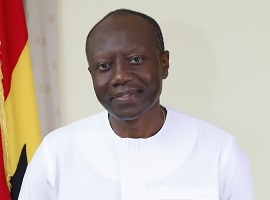- Home - News
- Elections 2024
- News Archive
- Crime & Punishment
- Politics
- Regional
- Editorial
- Health
- Ghanaians Abroad
- Tabloid
- Africa
- Religion
- Photo Archives
- Press Release
General News of Thursday, 5 June 2025
Source: www.ghanawebbers.com
Red Notice for Ghana's wanted Ex-Minister deepens national divide

The Office of the Special Prosecutor (OSP) has declared former Finance Minister Ken Ofori-Atta a wanted person for the second time. This declaration heightens Ghana’s already tense political and legal climate. The OSP is investigating serious corruption allegations linked to the National Cathedral project and a contract with Strategic Mobilisation Ghana Ltd.
Mr. Ofori-Atta has repeatedly failed to respond to summonses from the OSP. This non-compliance led to his initial classification as a “fugitive from justice” in February. Special Prosecutor Kissi Agyebeng confirmed plans to request an INTERPOL Red Notice for him. Mr. Ofori-Atta is reportedly receiving medical treatment in the United States.
The investigation into Mr. Ofori-Atta involves multiple allegations of corruption during his time as Finance Minister. These allegations raise concerns about legality, transparency, and accountability regarding financial transactions related to both projects mentioned earlier.
Originally intended as a national monument, the National Cathedral project faces accusations of cost inflation and poor procurement practices. The revenue assurance agreement with Strategic Mobilisation Ghana Ltd. also lacks transparency and raises suspicions of financial misconduct.
These issues prompted formal investigations by the OSP, which included several summonses issued to Mr. Ofori-Atta. His failure to respond has led the OSP to escalate efforts to apprehend him, culminating in the request for an INTERPOL Red Notice.
The pursuit of Mr. Ofori-Atta carries significant legal implications under Ghana's Constitution. Article 14 guarantees rights such as due process, liberty, and a fair trial.
Mr. Ofori-Atta’s legal team submitted medical documentation citing a recent cancer diagnosis and health deterioration. They requested permission for him to provide a statement virtually under the Electronic Transactions Act, but this was rejected by the OSP.
His absence due to health issues complicates matters further. The Office of the Special Prosecutor Act mandates independent investigations into alleged corruption, emphasizing accountability through physical appearances.
Legal experts note that while the OSP can issue summonses, it must respect individual rights within constitutional limits. This high-profile case will test Ghana’s justice system's strength and impartiality.
Through his lawyers, Mr. Ofori-Atta may argue that his health prevents compliance with summonses from the OSP. They might claim that these actions are politically motivated and deny due process rights.
Under Act 959, the OSP can subpoena individuals and request an INTERPOL Red Notice if necessary. Possible next steps include:
1. Formal Extradition Request: If he is in the U.S., extradition proceedings can be initiated.
2. INTERPOL Red Notice: This alerts member countries about locating Mr.Ofori-Atta pending legal action.
3. Diplomatic Channels: Engaging U.S authorities could facilitate legal cooperation.
4. Legal Representation: Hiring U.S.-based counsel may help navigate extradition laws.
The political implications are significant for both major parties in Ghana's government landscape—the ruling NDC faces pressure from opposition NPP over these allegations.
Public trust is at risk amid accusations involving state funds on symbolic projects like the National Cathedral project—this could erode confidence in governance overall.
While some view these actions as steps toward accountability, others see them as politically charged moves leading to intense public debate on transparency and justice.
The NDC may use this situation as evidence of mismanagement while calling for transparency or inquiries into corruption claims against their opponents in government.
Conversely, NPP might defend Mr.Ofori-Atta by highlighting his contributions while questioning whether due process is being upheld during this investigation.
Nonpartisan observers will closely monitor how this case affects Ghana’s democratic integrity while advocating for fairness throughout investigations respecting due process rights.
Internationally, misuse of public funds raises ethical concerns about governance standards in Ghana—issuing an INTERPOL Red Notice could signal either strong anti-corruption efforts or internal instability abroad.
Multilateral organizations like IMF or World Bank assess countries based on governance; thus this case may influence foreign aid or investment decisions moving forward regarding Ghana's reputation globally concerning rule-of-law principles upheld domestically too!
This situation illustrates balancing due process against accountability needs effectively without undermining individual rights guaranteed constitutionally! How authorities manage these aspects will shape future trajectories legally/politically within country dynamics significantly!










